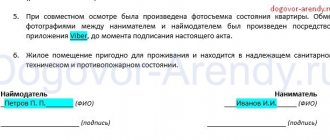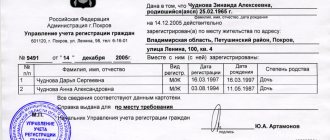Example of an eviction notice from a residential premises
Tumanova Victoria Yuryevna
address: 140412, Moscow region,
Kolomna, st. Partizanskaya, 29-48
from the owner of apartment No. 48, located
at the address: Russia, Moscow region,
Kolomna, st. Partizanskaya, 29
Tumanov Konstantin Fedorovich,
143505, Moscow region,
Istra, Ostrovsky Prospect, 43-5
You are a user of apartment No. 48 at the address: Russia, Moscow region, Kolomna, st. Partizanskaya, 29 on the basis of a court decision recognizing the right to use the above-mentioned residential premises. The indicated apartment belongs to me by right of ownership on the basis of a gift agreement dated August 10, 2005 (certificate of registration of rights, series AL No. 3546687).
In accordance with Part 4 of Art. 31 of the Housing Code of the Russian Federation, upon termination of family relations with the owner of a residential premises, the right of use for a former family member is not retained, except, inter alia, in cases where the right of use is retained on the basis of a court decision. At the same time, in accordance with Part 2 of Art.
As I learned, apartment No. 48 at the above address is not being used by you for the purpose established by the court: for living. You rent it out on a daily basis, which is confirmed by advertisements on the ABiDo website and information from neighbors. In addition, based on a complaint against neighbors, the local police commissioner conducts an investigation into violations of public order.
I notify you of the need to eliminate the violation of the court-established procedure for the use of residential premises - apartment No. 48, located Russia, Moscow region, Kolomna, st. Partizanskaya, 29 within 10 calendar days from the date of receipt of this notice. Otherwise, I will be forced to go to court with a claim for eviction.
August 30, 2020 Tumanov K.F.
Notice, demand, warning
When considering housing issues, there are three types of official documents:
- Warning;
- Requirement;
- Notification.
Any of them is relevant at a certain stage of consideration of the issue, has different goals, as well as the essence of the information conveyed.
Warning
Refers to the initial stage of the owner's claims against the tenants. Presented orally and in writing. Issued before going to court to resolve the issue peacefully.
This may be due to the inappropriate behavior of the residents, as well as improper use of the apartment. If the tenant ignores the warning, the owner has the right to file a lawsuit.
Requirement
There are two options:
- Notice - the owner verbally notifies the tenants that they must leave the premises due to its sale or for some other compelling reason. In this case, a period is given to collect the residents' belongings.
- Compulsory - the owner of the apartment persistently demands to leave the premises due to indecent behavior or violation of the rules for using the apartment. Or, in a short time, eliminate all the violations that he committed.
This video will tell you how to evict from an apartment through the court:
The requirement is presented before going to court; however, if it is ignored, the homeowner has the right to appeal to higher authorities.
Notification
Notification is provided after the court hearing on the housing issue. Has justified reasons for eviction, reference to the resolution. It is characterized by a specific period within which residents must leave the premises. This document is not subject to change.
What is forced eviction?
This is a compulsory measure, which is intended to free the living space from the offender along with his family members.
It can be carried out either with or without providing an alternative.
It is always carried out only by authorized bodies (FSSP) by court decision.
No private person can forcibly evict a person from an apartment. The right to housing is enshrined in Article 40 of the Basic Law of the Russian Federation.
When to file a notice to vacate a residential property?
The grounds for preparing a written document are:
- the intention of the homeowner to terminate the right of third parties to use his residential premises. As a general rule, when family relationships are terminated, the right to use the residential premises of the former family member of the owner is terminated. Then such citizens must vacate the premises within the period established by the owner
- the intention of the homeowner to terminate the right of use by persons whose right is established by a court decision (on recognition of the right of use, recognition as a member of the owner’s family), on the basis of a testamentary refusal. In this case, an eviction notice is prepared when the user uses the apartment for other purposes, violates the rights and legitimate interests of neighbors, mismanages the living space, and allows its destruction. The user warns of the need to correct deficiencies in a timely manner. And if they are not corrected, you can file a claim
- eviction of a temporary tenant. Such persons must vacate the premises within 7 days from the date of notification by the tenant (unless another period is established by the tenant)
- eviction of tenants under rental and sublease agreements
- requirement of a bailiff under a writ of execution within the framework of enforcement proceedings.
Documents attached to the claim
In order to confirm that he is right, the plaintiff must attach the following package of documents to the application sent to the court:
- certificate of ownership of the apartment;
- social rental agreement;
- plaintiff's passport;
- apartment card;
- notice of pre-trial settlement;
- certificate of marriage or divorce;
- children's birth certificates;
- receipt of payment of state duty;
- other documents indicating the legality of the plaintiff’s claims.
Since the grounds for eviction can be very different, the package of documents in each specific case can differ quite significantly.
To determine what information you need to provide specifically for you, it is best to seek advice from a professional lawyer
Grounds and conditions
The Civil Code of the Russian Federation speaks about this, specifically Article 293. According to it, a citizen can be “asked to leave” if he:
- systematically violates the rights of those living in the neighborhood, creates a threat to their safety and living comfort;
- uses housing for non-residential purposes (for example, equipped an apartment as a hairdresser);
- lost the right to use the apartment as a result of the termination of family relations;
- lives in a house that is officially recognized as dilapidated or in disrepair;
- does not pay for provided utilities;
- there is a mortgage debt and the citizen does not seek to repay it;
- moved in illegally;
- arranged an illegal redevelopment.
Read more about the grounds for eviction of registered citizens who are not owners here.
Contents of the document
It starts with a statement of claim.
We suggest you familiarize yourself with How to correctly write pre-worked time
The document is submitted, in accordance with the Civil Procedure Code of the Russian Federation, at the location of the defendant.
Mandatory in the claim
- full name of the court;
- passport information of the evicted applicant;
- requirement to evict (specify legal norms);
- why do you think that the specified person no longer has the right to stay within the walls of the house;
- what pre-trial measures were taken and what results they produced;
- what papers do you use to support your claim?
We recommend that the eviction notice be in writing and delivered to the owner either in person (you can draw up a Refusal Signature Certificate) or with a postal return receipt. These documents will be useful in court as evidence in a civil case. After all, a person can only be forcibly evicted through a judicial procedure.
The document will be given legal force by the following information:
- about the notification recipient
- about the sender of the document
- Name
- reason for eviction: termination of the right to use, violation of rights and legitimate interests, use of the premises for other purposes, etc., with references to regulations
- the period within which the premises must be vacated
- date and signature.
It is not difficult to draft an eviction notice, unlike the procedure for judicial review of such categories of cases.
Need a lawyer
https://www.youtube.com/watch?v=https:accounts.google.comServiceLogin
In order for your statement of claim to be accepted by the court for proceedings, you must draw it up in compliance with all the norms established by the legislator. To find out how to do this correctly, please contact our website specialists for a free consultation.
In general, contacting a lawyer will help you save not only time, but also nerves, because he will be able to help you with:
- drawing up a claim;
- collecting documents;
- searching for witnesses;
- representing your interests in court.
Save the link or share with friends
If you still have questions about which document is best to send to the tenant whom you want to evict from the occupied space, then be sure to contact the consultants of our website in any convenient way and receive free qualified legal assistance.
How a lawyer specializing in housing disputes can help:
- clarification of current legislation;
- drawing up a warning and demand for eviction;
- drawing up a statement of claim, collecting the necessary documents;
- issuing an eviction notice;
- representing your interests both in court and in other authorities.
From council housing
This means the early termination of a social tenancy agreement, which is usually concluded on an indefinite basis.
This issue is regulated by Art. 83-84 Housing Code of the Russian Federation.
It is understood that the person being evicted is obliged, after the court decision on eviction from the residential premises has entered into force, to vacate the occupied premises together with his family and belongings at a set time and hand over the keys to the municipality.
Both the municipality, the State Housing Inspectorate and even private individuals can initiate eviction from municipal square meters.
As already mentioned, they can be evicted either with or without the provision of an alternative in the form of other housing - comfortable or not.
A comfortable option will be provided if, so to speak, it is not the person’s fault in the grand scheme of things that he is being asked to leave his native land - for example, a building goes to the state or a religious community if it is declared officially unfit for habitation.
In other cases, they usually provide a room in a dormitory.
Alternative housing is not provided if a person destroys an apartment (this also includes illegal redevelopment, and there must be a threat of collapse), endangers the life and health of other residents, violates their rights, or renders the apartment uninhabitable. This also happens in the event of deprivation of parental rights.
We invite you to familiarize yourself with a sample of organization details in 2020
Find out whether you can be evicted from your only home in our article.
Papers after the trial
- the court's decision;
- performance list;
- inventory of property and eviction act;
- document on deregistration.
A judicial eviction usually takes three months. The first two are usually occupied by the preliminary hearing and consideration of the case. Then another month remains as a period for appeal. And only after this the decision comes into force.
The court decision specifically states that it is the legal basis for the defendant's discharge. The plaintiff with this document comes to the territorial department of the Federal Migration Service or the passport office and the defendant will be deregistered unilaterally. Eviction may occur without provision of alternative accommodation.
To implement the court decision, the final document on the case is sent to the FSSP. From there, subpoenas are sent to the participants in the case. It may very well be that the person being evicted does not want any trouble and will vacate the premises himself. If this does not happen, the bailiffs will be kicked out of their homes without ceremony. After this, the evicted person’s belongings are sent to the storage location and a decision is made to terminate the proceedings.
Read about the process of eviction from municipal housing, from hostels and tenants who do not pay rent in the materials on our website.
What documentation is prepared at the beginning of the procedure?
Let's consider the procedure for eviction from an apartment by court decision. This question is very complex and takes a lot of time. To begin with, the initiator tries to “reach out” to the offender using letters.
All notifications must be sent by registered mail with notification and a list of attachments, handed over to the addressee personally against signature.
Warning
Warning about eviction from residential premises - sample
This is a document in which the owner makes it clear to the tenant that his lifestyle does not suit him, indicates unacceptable violations and necessarily stipulates a deadline for their elimination.
In principle, this can be done orally, but then in court you will have to prove that the owner gave the negligent guest a delay to correct the situation.
Requirement
Request for eviction from residential premises - sample
There are two types: notification and compulsory.
In the first case, for example, the owner decides to sell the apartment or simply notifies that the tenant’s registration is coming to an end, and he is not needed for a new term.
In this case, it is also necessary to provide a period so that the expelled guest can take care of resolving the housing issue.
A compulsory demand is issued when the owner, say, becomes aware of unacceptable violations and he sets a condition: eliminate the violations or get out of the apartment.
Sample notification
Notice of eviction from an apartment - sample
It contains an indication of the reason and regulatory document (for example, a court decision on eviction from an apartment), according to which the tenant is asked to vacate the premises within a specified period.
In this case, you will need to provide the following documents:
- general civil identity card;
- social tenancy agreement or title papers;
- state duty check (it is 300 rubles);
- extract from the house register;
- a copy of the financial and personal account;
- evidence that the demand to evict is legal.
While the case is being considered, two months will pass - this is Art. 154 Code of Civil Procedure of the Russian Federation. Another two will be taken by making a decision and filing a cassation complaint (Article 119 of the same code).
According to Art. 428 of the Code of Civil Procedure of the Russian Federation will take another month to issue a writ of execution. And another two months are allotted to the bailiffs for the process of expelling the offender with all his “belongings” (Federal Law No. 229-FZ).
The deadlines may increase - failure of the responding party to appear at the meeting, complaints, requests to postpone, etc. also play a role here.
So it turns out that not just a registered tenant who has no rights, but even the authorized owner of the apartment can be evicted if he does not comply with the requirements for using the apartment or creates a threat to other residents of the house.
We invite you to familiarize yourself with the entry in the work book about a transfer to another position: how to correctly draw up a sample and special cases: to another department, transfer of a director
And if this is exactly what you are facing, you need to contact a competent lawyer as quickly as possible, who will not allow an unfair decision, and in general will reduce the risk of eviction to the street to a minimum.
Reasons for expulsion from an apartment
Forced eviction from an apartment by the owner is possible in the following cases:
- termination of family relations (for example, divorce or the emergence of alimentary obligations in relation to members of the former family - so that in this context even a child can become an “ex” member of the family);
- non-payment of utilities;
- systematic complaints about illegal behavior (use of an apartment not as a residential premises, subletting without approval, violation of the rights of those living in the neighborhood);
- expiration of the registration period or its early termination by court decision.
You just need to understand this term correctly - eviction of tenants by the owner.
As already mentioned, only the court has such a right, which means that the owner of the apartment can sue the negligent guests in court and win, and then the bailiffs will complete the matter.
If the tenants are, as they say, wrong all around - for example, they don’t pay for their accommodation, then the owner has no right to turn them out - in this case he has every chance of becoming the accused.
And if it also turns out that in his anger he somehow harmed an unwanted tenant, then everything is even worse - the violent owner may be charged under a criminal article, specifically, arbitrariness (Article 330 of the Criminal Code of the Russian Federation).
The owner himself
Is it possible to evict an apartment owner? It turns out that it is very possible. This happens in the following cases:
- non-payment of housing and communal services;
- destruction of the apartment;
- use of housing as non-residential premises.









